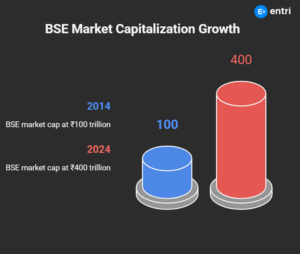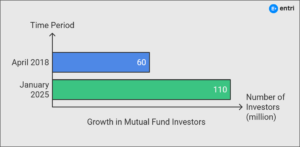Table of Contents
Are you wondering where to invest? Does stock market add up to the profit than mutual funds? Which is the best choice, share market or mutual funds? First lets know the actual difference between shares and mutual funds through this blog.
Check out this video on Mutual Funds by Entri in Malayalam!
What is the Share Market and Mutual Fund?
Share Market
Let’s break down these two modes of investments. A share market also known as a stock market , is like a giant marketplace, where people sell and buy small fragments of companies, just like a chunk of meat. These fragments are called ‘shares’ or ‘stocks’ and they represent your ownership in a company. Sounds cool, right? When you buy a share or stock, you become a part owner of the company (in a very minute scale!).
Source: BSE
To understand it better, consider a family size pizza. The more slices you get the more you would be happy. In the same way, if the company were a pizza, the slices would be the shares that you would own. The more you have would increase your stake in the company.
Also read: Stock Market Trading Series: An Introduction
The major goal would be the same for all types of investment: buy shares when they are low in price and sell them when they are high. Another underlying goal, is to help companies grow and raise money by letting people invest in such companies that they believe will succeed.
Mutual Funds
Imagine a group of friends who decide to chip in and buy a basket full of normal fruits. During summer, the price of these fruits rise and thus the value of the basket also rises. Selling the fruits at this point would lead to profit for all the friends. Now, if it is in a season, where there is an oversupply of these fruits, the price goes lower and results in a loss.
Also read: What is a Mutual Fund and how does it Work? (Complete Guide)
This whole idea is what constitutes mutual funds. The same concept is applied when a group of people pool in money to invest in things like stocks, bonds, or other assets. The highlight is that, instead of investing in one single stock, you are investing or buying tiny parts of many things. In this way, even if one tiny part is in loss, the others may be in profit. A professional manager would handling the funds and deciding where to invest.
Source: Wikipedia
The various types of mutual funds are:
- Equity funds
- Debt funds
- Hybrid funds
- retirement funds
- children’s Fund
- index funds
- exchange-traded funds
Mutual Funds vs Stock Market
1: What is a stock?
In share marketing the form of investment will be direct investment whereas, the form of investment in mutual funds is indirect. Below are the difference between them:
| Share Market | Mutual Funds |
| You can buy only one particular share from the holder | The investor can choose a diversified portfolio with a one-time investment |
| You gain more choices in the decisions of the stock | You do not gain much control over the investments as decisions are taken by the fund manager |
| No choice of fixed investment as the prices vary day-to-day
Need for monitoring the prices constantly becomes a necessity |
You can make investments for a fixed period within a fixed plan |
| Charges- brokerage and transaction | Charges- fund management, front-end load, back-end load, early redemption, etc. |
| Long term returns from 14-16% can be expected | Average return rate is 8% |
| More riskier due to price volatility | Less risk |
Also read: How to Make 1000 Rs Daily in the Stock Market?
What about the Returns?
Now lets compare the average percentage of returns and profits of latest stocks and mutual funds.
| Fund |
Current value (lakhs) | 1-Year Return (%) |
| Quant Small Cap Fund | 12.76 | 30.76 |
| ICICI Prudential Infrastructure Fund | 12.74 | 30.69 |
| Motilal Oswal Midcap Fund | 12.71 | 30.60 |
| SBI PSU Fund | 12.22 | 28.93 |
| Franklin Build India Fund | 11.84 | 27.61 |
| Bandhan Infrastructure Fund | 11.73 | 27.23 |
| Nippon India Power & Infra Fund | 11.69 | 27.07 |
Also read: How to Buy Shares in Zerodha
The given below table shows the returns of the variant stocks.
| Stock |
3-Year Return (%) | Price (₹) |
| HDFC Bank Ltd. | 16.84 | 1,709.90 |
| Bharti Airtel Ltd. | 137.43 | 1,653.15 |
| ICICI Bank Ltd. | 78.9 | 1,248.10 |
| State Bank of India | 50.44 | 728.65 |
| Bajaj Finance Ltd. | 25.13 | 8,338.80 |
| ITC Ltd. | 69.96 | 406.95 |
Learn investing with Entri App! Learn today Earn tomorrow!
Is it Risky?
As stated above, mutual funds have the benefit of lessening the risk by buying in a large number of stocks. Stocks are exposed to the market conditions and the appearance of one stock can’t recompense for the additional. Thus normally, the stock markets face a higher risk factor as compared to other forms of investing. But the risk factors reside with every investment. Thus, it is important to verify and look forward and understand the stock you are investing in.
Points to consider while investing in stock:
- Always makes sure that you invest the surplus or excess or profit
- Make sure not to invest all of your profit due to the stock market excitement you undergo
- Constantly make connections with the stock marketing field and build your understanding
- If you are not sure about the analysis manner, ask for advice
- Constantly check the ratio and other fluctuations in the finance of the market
- If found any fluctuations hindering your profit, make sure to take the proper moves at the right time
LEARN ABOUT MUTUAL FUNDS JOIN NOW !
Is it Worth Trying?
Definitely it is! The stock market demands more attention compared to mutual funds. In many ways, mutual funds can be more calming and less time consuming than the stock market. But in terms of the profits and other benefits with sudden growth, the stock market and trading stand at their high point. The need for constant checking and analyzing of the stock market is necessary. With proper understanding, intervention and decisions, the stock market can raise the stands of investing.
Coming back to the question which is the best? It is necessary to understand both pros and cons of stock marketing and mutual funds. Both have their points of merit and demerit. If you are ready to risk and monitor with perfect understanding and strategies, it is beneficial to consider stock marketing. Without perfect knowledge regarding the fields, it isn’t wise to fall for it.
If you are interested in stock marketing and find it hard to understand or if you are willing to invest and do not know the smart strategies, download Entri App and join the stock market courses to gain the perfect understanding. Learn Today and Earn Tomorrow!
Whereas if you don’t have time to be constantly analysing the market , you can enrol for Entri’s mutual funds course to start your journey towards financial independence with industry experts and top-notch quality materials.
| Gain Financial Literacy in your Mother Tongue | |
| Stock Market Course in Malayalam | Mutual Funds Course in Malayalam |
| Stock Market Course in Tamil | Mutual Funds Course in Tamil |
| Stock Market Course | Mutual Funds Course |















